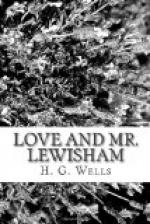The book was a collection of Browning’s Poems, and it contained “Sludge”; it also happened that it contained “The Statue and the Bust”—that stimulating lecture on half-hearted constraints. “Sludge” did not interest Lewisham, it was not at all his idea of a medium, but he read and re-read “The Statue and the Bust.” It had the profoundest effect upon him. He went to sleep—he used to read his literature in bed because it was warmer there, and over literature nowadays it did not matter as it did with science if one dozed a little—with these lines stimulating his emotion:—
“So weeks grew months,
years; gleam by gleam
The glory dropped from their
youth and love,
And both perceived they had
dreamed a dream.”
By way of fruit it may be to such seed, he dreamed a dream that night. It concerned Ethel, and at last they were a-marrying. He drew her to his arms. He bent to kiss her. And suddenly he saw her lips were shrivelled and her eyes were dull, saw the wrinkles seaming her face! She was old! She was intolerably old! He woke in a kind of horror and lay awake and very dismal until dawn, thinking of their separation and of her solitary walk through the muddy streets, thinking of his position, the leeway he had lost and the chances there were against him in the battle of the world. He perceived the colourless truth; the Career was improbable, and that Ethel should be added to it was almost hopeless. Clearly the question was between these two. Or should he vacillate and lose both? And then his wretchedness gave place to that anger that comes of perpetually thwarted desires....
It was on the day after this dream that he insulted Parkson so grossly. He insulted Parkson after a meeting of the “Friends of Progress” at Parkson’s rooms.
No type of English student quite realises the noble ideal of plain living and high thinking nowadays. Our admirable examination system admits of extremely little thinking at any level, high or low. But the Kensington student’s living is at any rate insufficient, and he makes occasional signs of recognition towards the cosmic process.
One such sign was the periodic gathering of these “Friends of Progress,” an association begotten of Lewisham’s paper on Socialism. It was understood that strenuous things were to be done to make the world better, but so far no decisive action had been taken.
They met in Parkson’s sitting-room, because Parkson was the only one of the Friends opulent enough to have a sitting-room, he being a Whitworth Scholar and in receipt of one hundred pounds a year. The Friends were of various ages, mostly very young. Several smoked and others held pipes which they had discontinued smoking—but there was nothing to drink, except coffee, because that was the extent of their means. Dunkerley, an assistant master in a suburban school, and Lewisham’s former colleague at Whortley, attended these assemblies through the introduction of Lewisham. All the Friends wore red ties except Bletherley, who wore an orange one to show that he was aware of Art, and Dunkerley, who wore a black one with blue specks, because assistant masters in small private schools have to keep up appearances. And their simple procedure was that each talked as much as the others would suffer.




